How Many Bank Accounts & Credit Cards Do You Actually Need?
Before signing on the dotted line and opening that new account, we strongly encourage you to think through the benefits and potential ramifications, and ask yourself if you really need whatever that new card/account/product is offering, and more importantly, if you would still open that new account if there were no associated promotion.
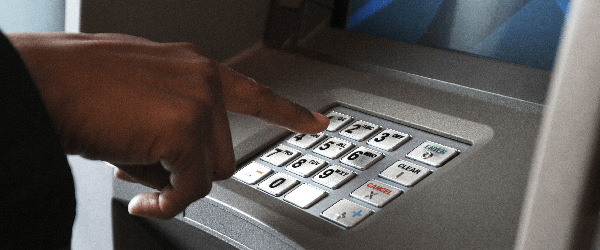
How Many Bank Accounts Should You Have?
We like to tell our customers that the goal is to have enough bank accounts to manage their finances effectively, but not so many that it makes their finances difficult to track. It is important to be mindful of your finances at any given time, and while opening a new account may be beneficial, there is always a point of diminishing returns.
At the very least, you should have a checking and savings account. The checking account, also referred to as your operating account, is the account you use to run your business day-to-day, whereas your savings account holds funds that you don’t plan to use in the short term. A good rule to set for yourself is to have enough to cover 1-2 months of expenses in your checking account, and enough to cover 3-6 months expenses in your savings account (If you are in an industry or business with irregular income or revenue cycles, we would recommend giving yourself even more runway). This ensures that you are ready to cover immediate expenses, while also maintaining a safety net in case of the unplanned.
If you share (or plan to share) your finances with another person, you will want to consider if it makes sense for you and your partner to have completely combined accounts or if keeping some of your finances separate is a better option for you. To learn more about how Mark and his wife agreed to split up their finances, check out his post, The Financial Strategy That Saved My Marriage.
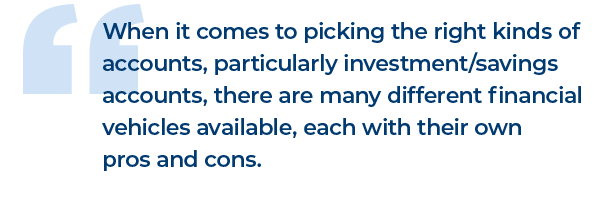
When it comes to picking the right kinds of accounts, particularly investment/savings accounts, there are many different financial vehicles available, each with their own pros and cons. Of course, your bank will be glad to open you a savings account along with your checking, and this may be a good option for you as a “cushion”; however, there are many other options that offer better rates, ranging from relatively liquid high-yield savings accounts to long-term 529 education savings plans. To explore which of the many investment options available make the most sense for you, we strongly recommend that you consult with a knowledgeable and qualified financial professional.
A note regarding opening multiple savings accounts for different purposes or “goals” (such as a “marketing account”, “payroll account”, “new car account”, etc) – some people choose to have separate savings accounts with specific goals associated to each one, and while this may work for some people, in general, we recommend keeping fewer accounts and managing your savings goals with an accounting tool such as You Need a Budget (for personal finances) or QuickBooks Online (for business finances).
Can you have too many bank accounts?
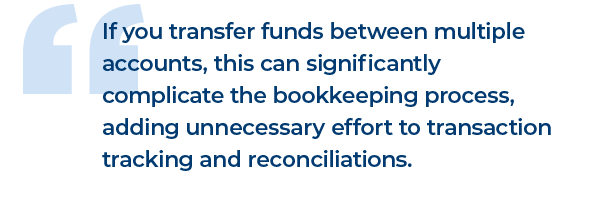
Finally, it is important to consider the downsides associated with new accounts – oftentimes banks charge account service fees for each account. If you maintain accurate bookkeeping and record keeping, you also have to go through the steps of downloading extra statements and reconciling these accounts. More importantly, if you transfer funds between multiple accounts, this can significantly complicate the bookkeeping process, adding unnecessary effort to transaction tracking and reconciliations.
With the number of accounts that are available for you, it becomes too easy to accumulate accounts. When considering opening a new account, you should not only understand its benefits and purpose, but you should also consider how it fits into your overall financial strategy and whether or not it is truly necessary for you.

How Many Credit Cards Should You Have?
Unlike checking and savings accounts, which are typically offered by reputable financial institutions (for guidance on what to look for in a bank, check out this article), it almost feels like anyone can put out a credit card – whether you’re at The Gap or the sports stadium, there is a near-constant barrage of offers to open a new credit card.
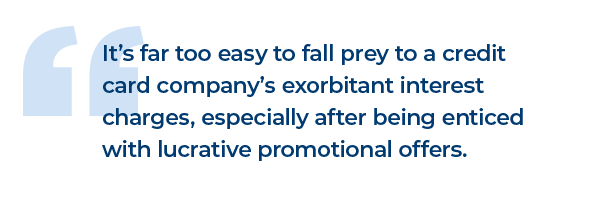
Credit cards can include many benefits, some of which will be more valuable to you than others, but they also often have a cost – whether it’s an actual membership charge or interest you’ll end up paying, you should always weigh the value you get from a card against its costs.

- Protection benefits you get from a credit card can include purchase and fraud protection, extended warranties on things you buy, lost luggage insurance, preferred pricing and benefits on things like travel and car rentals, trip cancellation insurance, etc. Depending on your spending habits, these perks can have a lot of value and give you peace of mind above and beyond what you would get if you paid with cash or debit card. You should note, however, that some of these “higher-value” benefits often come with a membership fee, so if you are primarily opening the card for the benefits, you should consider what the value really will be to you.
- What we’re calling “cash-back benefits” are things like cash back on purchases, airline miles, and/or redeemable points. These perks can help separate one card from another, but can very quickly be offset by credit card membership fees and are usually completely outweighed if you are carrying a balance on your card. To me, these sort of incentives are far less meaningful than the “protection benefits”, although they can be important if you pay your cards off in full each month.
- Finally, there are a lot of credit cards, particularly from retailers, that offer something like “XX% off your purchase if you open our credit card today!”, “Get two free shirts when you open this card!”, or “No interest if paid in full within XX months!” We look at these as the most predatory type of promotions since they intentionally entice people who may not understand the long-term impact to open cards that they (usually) don’t need. Additionally, these store credit cards also tend to offer higher APR’s than average interest rates, so unless you are paying off in full each month (or within the term of the promotion), you may even end up paying more for your purchase than if you had just paid retail for it up front.

- Interest rate– the single most important thing to consider, especially if you expect to be keeping a balance on your card, is the interest rate or APR (annual percentage rate) – the APRs offered by different cards can vary wildly, and if you ever end up not paying off your card in full, can completely offset whatever benefit(s) the card you chose had over its competitors. Additionally, you need to check if the APR you’re getting is locked in or if it’s promotional and will change over time – if an interest rate looks too good to be true, it probably is!
- Fees– many of the cards that offer the “best” benefits, also have associated fees. You should always determine if the benefits you get from a card outweigh the costs, not just when you get it, but over time as well. In some cases, a card will offer a sign-up bonus that will offset a card’s fees for a year or two, or a card may offer to waive the fees for the first year, but understanding the long-term cost of the card is important.
- Impact on your credit score– there are a lot of things associated with credit cards that can affect your credit score – credit checks when you get a card, how many cards you have, your ability to pay off your cards, your spending relative to your total available credit, etc. – but as a rule, you want to do your very best to never spend more than you will be able to pay off in full each month and not open more cards than you need. If opening a new card will make you less likely to pay off everything you owe in full, you should definitely reconsider.
- Would you open the card if you weren’t getting the promotion? This is a great question to ask yourself if you are considering opening a new credit card due to the savings or discount being offered – if the answer is “no”, that’s a good sign that it’s probably not necessary!
Can you have too many credit cards?
Ultimately, there’s no one-size-fits-all number of credit cards that a person should have – we encourage our customers to keep two cards, one credit card for everyday purchases and a second that is used only for subscriptions, and for many people, just one credit card is plenty. As a rule of thumb, you should feel confident that each card you have to your name provides you with value and has a specific purpose. If you have multiple credit cards that you use for the same thing and/or in the same way, it’s a good sign that you have more than you need.
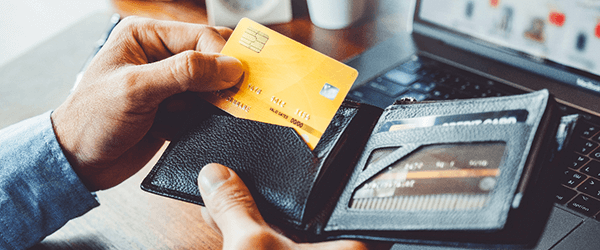
Answer These Questions Before Opening a New Account
In short, when thinking about your personal and business finances, be mindful about what accounts you have, how you use them, and the benefits they offer.
And when in doubt, ask yourself:
- Do I have multiple cards or accounts that I use in the same way?
- Do I find that my accounts are providing me with the value and services I’m looking for?
- Do my accounts make it easier or harder to get a grasp on my finances?
- Am I able to keep my various accounts, statements, and cards organized?
- Would I open that new account if there were no associated promotions?